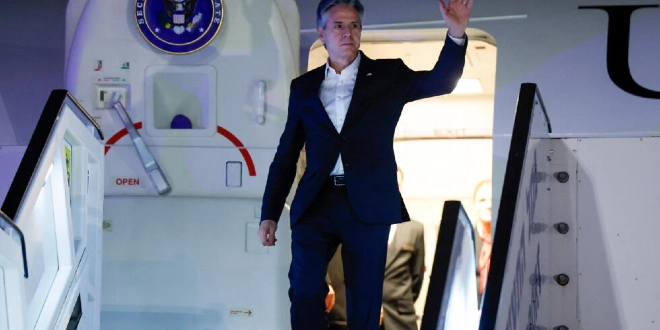U.S. Secretary of State Antony Blinken is spearheading a critical diplomatic effort in the Middle East, focusing on post-war strategies for Gaza amid the ongoing conflict with Israel. During his urgent mission, Blinken has successfully garnered the commitment of key Arab nations and Turkey to begin planning for Gaza’s reconstruction and governance after the war against Hamas concludes.
Blinken’s initiative comes during his fourth visit to the Middle East since the war started in October. His efforts have led to Saudi Arabia, Jordan, Qatar, the United Arab Emirates, and Turkey agreeing to consider participating in and contributing to post-war scenarios for Gaza, which has been severely impacted by three months of intense Israeli bombardment.
Initially, these countries hesitated to engage in post-war planning, advocating for a ceasefire and a reduction in civilian suffering due to Israel’s military response to Hamas’ attacks on October 7. However, they have now shown readiness to start planning, with each nation evaluating its involvement in the eventual plan.
Blinken’s discussions have included meeting with key figures like Saudi Crown Prince Mohammed bin Salman in Al Ula, Saudi Arabia. He has also engaged with leaders in Turkey, Greece, Jordan, Qatar, and the UAE. The common objective among these leaders is to prevent the conflict from escalating and spreading, focusing on stabilizing and aiding Gaza, charting a political path forward for Palestinians, and striving for long-term peace and stability in the region.
Despite not detailing specific contributions, financial and in-kind support from the UAE and Saudi Arabia could be critical to any successful plan. Arab states have consistently called for a ceasefire since mid-October, as civilian casualties have surged.
In his upcoming meetings with Israeli Prime Minister Benjamin Netanyahu, Palestinian leader Mahmoud Abbas, and Egyptian President Abdel Fatah Al-Sisi, Blinken plans to present these Arab commitments. The success of any post-war plan for Gaza hinges on both Israeli and Palestinian agreement. Netanyahu’s government has its own vision for Gaza’s future, which might not align with others’, and remains opposed to the concept of a two-state resolution to the conflict.
One of Blinken’s immediate priorities is to increase humanitarian assistance to Gaza. Despite Israel opening its Kerem Shalom crossing, the rate of aid trucks entering Gaza remains below pre-war levels and the needs of the population. The U.N. reports that a significant portion of Gaza’s 2.3 million population is reliant on aid and facing severe hunger challenges.


